Content
The Beatles
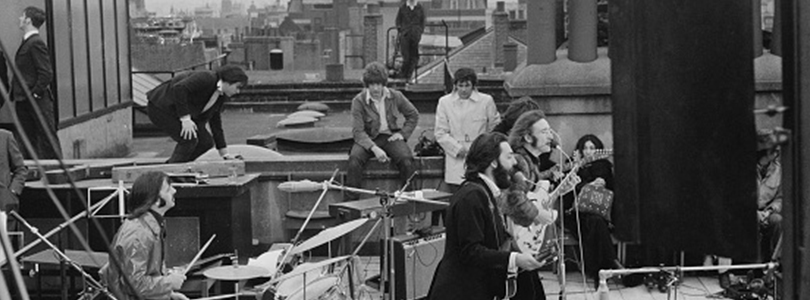
Over the rooftops of London, 30 January, 1969
Apples & Beatles
The Beatles´ very first concert
Have you heard of ‘The Quarrymen’? ‘Johnny & The Moondogs’? Or ‘Long John and the Silver Beetles’? No? Exactly. Who knows if John Lennon's group would ever have become the band of the century if they hadn't come up with a catchier name. On 17 August 1960, the group consisting of Lennon, Paul McCartney and George Harrison (but without Ringo) performed for the first time as ‘The Beatles’. A play on words combining ‘beat’ (music) and ‘beetle,’ it was also reminiscent of Buddy Holly's backing band, ‘The Crickets’. The historic event took place in a dark basement on the Reeperbahn in Hamburg´s St. Pauli, the ‘Indra.’ The young band came to Hamburg a total of four times for several months and played night after night in various clubs in the red-light district. There they grew up, found their sound and their style (mop-top hairdo!). Thanks to their training period in Hamburg, they finally got their first record deal – even though they were a guitar band .
The end of the most commercially successful and artistically influential rock band of all time came rather quietly: Paul McCartney sent out a press release for his first solo album on 10 April 1970. In it, he succinctly stated that he was not planning any more albums with the Beatles and that the songwriting partnership with John Lennon was over. However, this marked the beginning of legal disputes, some of which continued into the recent past.
Apple Corps, the joint company of the four Beatles (not to be confused with Apple Inc.; more on this later), had denied separation rumours the day before. Now, however, it sent out a press release stating simply: "Spring is here and Leeds play Chelsea tomorrow and Ringo and John and George and Paul are alive and well and full of hope. The world is still spinning and so are we and so are you. When the spinning stops – that’ll be the time to worry. Not before. Until then, The Beatles are alive and well and the Beat goes on, the Beat goes on."
So the end of the band over half a century ago did not come with a big bang. In fact, John Lennon had already announced to his colleagues that he was leaving the band six months earlier. This was in mid-September 1969, a few days before the release of "Abbey Road", the last album the Beatles recorded together. At the request of the management, Lennon's departure was kept secret and his colleagues were probably not entirely sure at first how serious this announcement was.
There were many reasons for the end of the band: they hadn't played any concerts for years, so the team spirit was eroding; manager Brian Epstein, an important integrating figure, had died in 1967; the musicians had started families and had "grown up". John Lennon's drug use and his symbiotic relationship with Yoko Ono, who had to be present at all recording sessions, probably didn't help either. The Beatles had also achieved more than any other group, both artistically and commercially, so what else was there to come?
They let it be
Already during the recordings for the "White Album" in 1968 the cracks in the group had grown bigger and bigger. At the beginning of 1969, the group tried a "back to the roots" project to feel like a real band again and not just like contractually bound studio musicians: an album without technical gimmicks and elaborate recording tricks, but with film documentation and live performances. On January 30th the band gave their legendary last concert on the roof of their Apple office building at 3 Savile Row in central London. But the "Get back" project suffered from the constant arguments, the result didn't please any of the four and was put aside. In the end, the album was released only after the group split up in May 1970 - under the fitting title "Let it be".
After the split the quarrel really starts
The band's joint artistic work was history, but the lawyers were only just getting started: the complicated contractual relationships practically forced the former band members to sue each other and the former management in order to get free. Legally, the band only ended in December 1974, when all four ex-beatles signed a laboriously negotiated dissolution contract.
The rights to their songs, then owned by Northern Songs Ltd., have changed hands several times since then; at times they were owned by Michael Jackson, now they are owned by Sony ATV. McCartney, who has been trying for decades to (re)obtain the rights, sued the company in 2017; in the meantime an out-of-court settlement is said to have been reached.
From the hippie boutique to royalties management
Apple Corps, the joint conglomerate of the Beatles, was originally a very idealistic project, inspired by the flower power zeitgeist. For example, it generously gave out grants to artistic projects, almost all of which came to nothing, or ran a boutique in the heart of London where, in a hippie way, little value was placed on full payment of purchases. In short: with this company, the Beatles practically only made losses and were hopelessly overstrained as businessmen. In the end, this also contributed to the break-up of the group.
In 1968, the vinyl records of the "White Album" were the first to appear on the Beatles' own label with the Apple Records logo: a green apple of the variety Granny Smith, once from the outside, once in cross-section. It became the trademark of the last Beatles records. As with many other famous bands, it was not until long after their breakup that the idea of registering the name as a (word) trademark (DE 1148166,since 1988; also 000219048) was born.
Of the various branches of the hippie enterprise, only the record company Apple Records continued to exist for a while, which also had other artists under contract. Apple Corps is still owned by the four ex-Beatles or their heirs. It manages the merchandising rights and operates the official ![]() website of a band which has ended 50 years ago.
website of a band which has ended 50 years ago.
Apple vs. Apple
When Steve Jobs and colleagues founded a small computer company in a garage in California in 1976, they were not bothered by the fact that there already was a company called Apple, featuring an apple logo. But the Beatles company, headed by their former road manager Neill Aspinall, was "not amused": Apple Corps. sued Apple Inc. for trademark infringement in 1978 - the beginning of a decade long dispute. In the first settlement in 1981, Steve Jobs & Co. paid damages to Apple Corps. and promised not to become active in the music business.
When Apple computers made MIDI and audio recording possible in 1986, the Beatles company saw the agreement violated and sued the US company again. The same thing happened again in 1991, when Apple of London received millions in damages and forced a new agreement to keep Apple Inc. out of the music business.
The apple changes hands
The peace lasted until 2003, when the Americans entered the music business on a grand scale with iTunes. Apple Corps promptly sued the computer company for breach of contract. But in May 2006, a London court ruled that the trademark agreement of 1991 between the two companies had not been violated.
On February 5, 2007, the computer company announced that they had reached an agreement. It was speculated that a lot of money had flowed from Cupertino to London. In any case, Apple Inc. took over all "Apple" trademark rights, but at the same time announced to license some of them to Apple Corps. So it happens that the Beatles trademarks with the Granny Smith registered in 1969 are now owned by the younger computer company, but are still "exclusively licensed" to Apple Corps on Beatles records.
This is also the case on the remix reissues of the last albums, which were released on their 50th anniversaries, or on the "last Beatles song" called "Now and then", which was released at the end of 2023 and reached the top of the charts in the UK and Germany - 54 years after the band's last number one. The most recent of the Beatles' many records!
The most famous zebra crossing in the world
The iconic record cover of "Abbey Road" with the four Beatles on the crosswalk inspired countless parodies and imitators, but also brands: The record company EMI, which owns the studios of the same name where the album was recorded, secured "Abbey Road" in 1999 as a word mark (EM 001406735, IR 1115423) and in a stylized form as a word/figurative mark (EM 000135111, EM 001406800, EM 004337631).
The zebra crossing on Abbey Road is today a popular London landmark. From the studios (in which many of the greats of music are still recording today) a ![]() webcam is directed at it, by the way. At the peak of the Covid crisis, it appeared ghostly abandoned. The City of London used this opportunity to renew the ceded stripes.
webcam is directed at it, by the way. At the peak of the Covid crisis, it appeared ghostly abandoned. The City of London used this opportunity to renew the ceded stripes.
The Beatles and the brands
Decades after Beatlemania, the former band members or their heirs came up with the idea of protecting their famous names as trademarks:
"John Lennon" had widow Yoko Ono protected as a word mark for various Nice classes in 2016 (EM 015697022, EM 015712987). In 2000 Richard Starkey applied for protection of his stage name "Ringo Starr" as a word mark for music, clothing and entertainment products (EM 001670231, Nice classes 09, 25, 41). „George Harrison" was also registered as a word mark at times, but probably not by the musician who died in 2001, but by a textile company in Madeira (EM 000704247).
"Paul McCartney" was already registered as a word mark in 1998 (EM 000907972), in 2006 also the mere surname "McCartney" (EM 005032917). The rights owner is his company MPL Communications in London, which the Beatle had already founded in 1969. Paul McCartney, who is today considered the most successful pop composer in the world, was also productive as an inventor and has applied for a patent ( ![]() WO001995014987A1 (0,97 MB)).
WO001995014987A1 (0,97 MB)).
When song titles become trademarks
The titles of famous Beatles songs, on the other hand, have often been protected as trademarks by third parties - many of them only in recent years: "Strawberry fields", for example, is a registered trademark for cigarette paper (EM 012590519). The attempt to register an IR trademark for fruit and vegetables (Nice classes 29, 31) was rejected (IR 690505). "Hey Jude" had a company from New Zealand registered as trademark for computer products (Nice 09) in 2019 (EM 018133621).
"Sgt. Pepper's" (from the "Lonely Hearts Club Band", the epochal album from 1967) a Hamburg company secured as a trademark for tea in 2005 (DE 305455737). A Spanish company has applied for a word/figurative mark of the same name for clothing, among other things (EM 006100002).
When song titles become trademarks
An Austrian manufacturer of gaming machines registered "Octopus's garden" as a trademark in 2014 (EM 013397757). In Denmark in 2008 a company registered "Lucy in the sky" (EM 007220601) for various product classes (06, 09, 16, 20, 25, 28, 41). In contrast, the word mark "Yellow Submarine"(EM 000773051) was registered in 1998 for a number of different product classes by the London company Subafilms, which the Beatles founded in 1967 to market the animated film of the same name.
For the Beatles nickname "The Fab Four" a Canadian company applied for trademark protection in October 2019 (IR 1499994). Apple Corps filed an opposition against the registration of the word mark "BEATLES" in the plant trade (Nice, 31, 35) by a Dutch company (EM 017954469). Since 2018, a German company wants to offer sound recordings and other products under the brand name "A hard day's night"(DE3020182272146; Nice 41, 35, 42). "Twist and shout" is registered by an Italian company (EM 012349973). And "Let it be" has been registered by a London-based company as trademark for entertainment (EM 011610383; Nice 41) in 2013.
So even more than half a century after their separation, the story of The Beatles goes on and on. The four musicians from Liverpool have long since even surpassed legendary status, they are, as the ![]() „Spiegel“, wrote, "canonized": "The Beatleshave turned into an idea. That is true immortality".
„Spiegel“, wrote, "canonized": "The Beatleshave turned into an idea. That is true immortality".
Text: Dr. Jan Björn Potthast; Pictures: Getty Images / Evening Standard Hulton Archive, United Press International Photographer unknown Public domain via Wikimedia Commons, JBP, Keystone / Getty Images
Last updated: 11 February 2026

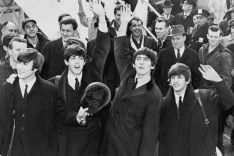
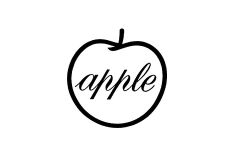
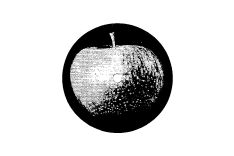
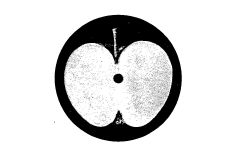
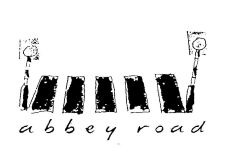
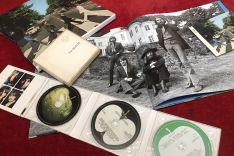
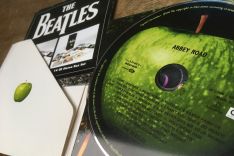
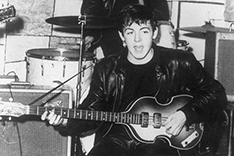
Not only protecting innovations
Social Media